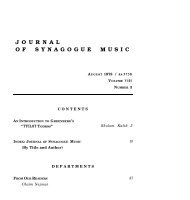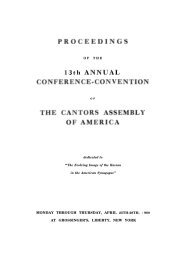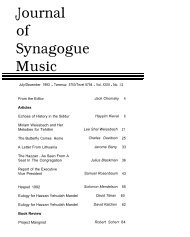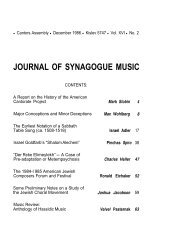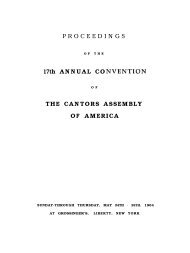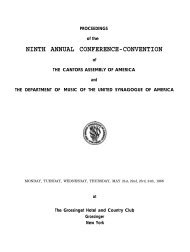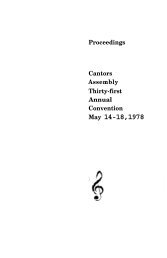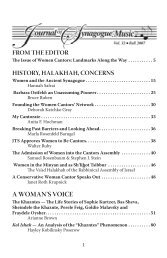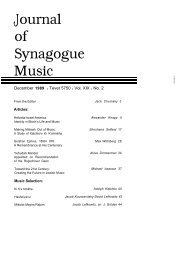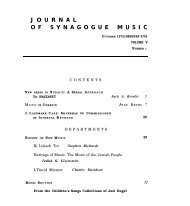Volume 7, Number 3 - Cantors Assembly
Volume 7, Number 3 - Cantors Assembly
Volume 7, Number 3 - Cantors Assembly
Create successful ePaper yourself
Turn your PDF publications into a flip-book with our unique Google optimized e-Paper software.
THE RIGHT KIND OF PRAYERS<br />
39<br />
SAMUEL CHIEL<br />
This sermon is dedicated by the author to Hazzan Max Wohlberg,<br />
as an affectionate tribute to a great man who has devoted his life to<br />
successfully teaching our people the art of prayer.<br />
Psychologists tell us that whatever we do is a clue to our lifestyle;<br />
the way we walk and dress, our gestures and our manner of speaking.<br />
Everything we do is a clue to our inner personality.<br />
The Rabbis of the Talmud add yet another dimension: they say<br />
that the way a person prays is also a clue to his philosophy of life.<br />
They, therefore, encourage certain kinds of prayers and discourage<br />
others. Some prayers, they feel, give greater meaning to life: others are<br />
harmful to the cultivation of a holy personality which is our faith’s<br />
ultimate goal.<br />
What are the wrong kind of prayers? The Talmud says: Hatzoek<br />
l’sheavar harey to t’filat shav: “To cry over the past is to utter a vain<br />
prayer.” The Mishnah cites this illustration of such a prayer. If your<br />
wife is pregnant, you should not pray, “May it be a boy! ” because the<br />
gender of the child has already been determined.<br />
Hatzoek l’sheavar: So many of us cry over the past. We say: “If<br />
only I had been a better mother or father, my child would have turned<br />
out so differently!” If a loved one dies, we cry: “If only I had been a<br />
better child, my parents would have been so much happier!” In our<br />
work we complain: “If only I had gone into another field, I would have<br />
really been happy...”<br />
So many of us walk around burdened with guilt, constantly<br />
punishing ourselves, torturing ourselves with all the “if onlys” that<br />
did not happen. But the Talmud says: Hatzoek l’sheavar harey LO<br />
t’filat shav: “To cry over the past is to utter a vain prayer.” It is<br />
simply wasted energy and wasted emotions. The past is gone, it cannot<br />
be changed. The real question for each of us is: what are you doing with<br />
your life now, today? What are you doing about your relationships<br />
with the people around you, your family and friends? How are you<br />
doing in your work now? Are you trying to do it as well as you can?<br />
And are you deriving from it as much fulfillment as possible?<br />
Nobody’s work is all bliss. Don’t dwell only on the unpleasant aspects<br />
of your job. Try to think about the parts of your work that give you<br />
gratification as well.<br />
Rabbi Samuel Chiel is spiritual leader of Temple Emanuel of Newton Centre, Mass.




